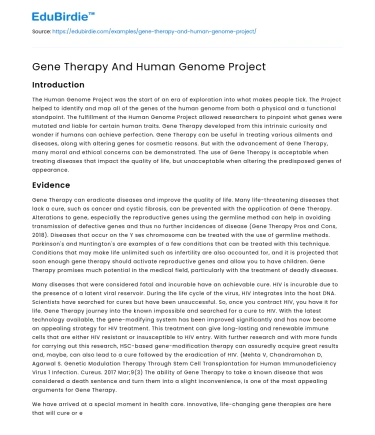Introduction
The Human Genome Project was the start of an era of exploration into what makes people tick. The Project helped to identify and map all of the genes of the human genome from both a physical and a functional standpoint. The fulfillment of the Human Genome Project allowed researchers to pinpoint what genes were mutated and liable for certain human traits. Gene Therapy developed from this intrinsic curiosity and wonder if humans can achieve perfection. Gene Therapy can be useful in treating various ailments and diseases, along with altering genes for cosmetic reasons. But with the advancement of Gene Therapy, many moral and ethical concerns can be demonstrated. The use of Gene Therapy is acceptable when treating diseases that impact the quality of life, but unacceptable when altering the predisposed genes of appearance.
Evidence
Gene Therapy can eradicate diseases and improve the quality of life. Many life-threatening diseases that lack a cure, such as cancer and cystic fibrosis, can be prevented with the application of Gene Therapy. Alterations to gene, especially the reproductive genes using the germline method can help in avoiding transmission of defective genes and thus no further incidences of disease (Gene Therapy Pros and Cons, 2018). Diseases that occur on the Y sex chromosome can be treated with the use of germline methods. Parkinson's and Huntington's are examples of a few conditions that can be treated with this technique. Conditions that may make life unlimited such as infertility are also accounted for, and it is projected that soon enough gene therapy should activate reproductive genes and allow you to have children. Gene Therapy promises much potential in the medical field, particularly with the treatment of deadly diseases.
Save your time!
We can take care of your essay
- Proper editing and formatting
- Free revision, title page, and bibliography
- Flexible prices and money-back guarantee
Many diseases that were considered fatal and incurable have an achievable cure. HIV is incurable due to the presence of a latent viral reservoir. During the life cycle of the virus, HIV integrates into the host DNA. Scientists have searched for cures but have been unsuccessful. So, once you contract HIV, you have it for life. Gene Therapy journey into the known impossible and searched for a cure to HIV. With the latest technology available, the gene-modifying system has been improved significantly and has now become an appealing strategy for HIV treatment. This treatment can give long-lasting and renewable immune cells that are either HIV resistant or insusceptible to HIV entry. With further research and with more funds for carrying out this research, HSC-based gene-modification therapy can assuredly acquire great results and, maybe, can also lead to a cure followed by the eradication of HIV. (Mehta V, Chandramohan D, Agarwal S. Genetic Modulation Therapy Through Stem Cell Transplantation for Human Immunodeficiency Virus 1 Infection. Cureus. 2017 Mar;9(3) The ability of Gene Therapy to take a known disease that was considered a death sentence and turn them into a slight inconvenience, is one of the most appealing arguments for Gene Therapy.
We have arrived at a special moment in health care. Innovative, life-changing gene therapies are here that will cure or ease debilitating diseases. Yet these expensive treatments are entering a market structure that was not built to price them.
Counterclaim
With numerous benefits of Gene Therapy, there is an apparent downside. A gene can't easily be inserted directly into your cells; rather, it usually has to be delivered using a carrier: a vector. Vectors are viruses that can recognize certain cells and carry genetic material into the cells' genes. This technique can promote an unwanted immune system reaction. The body's immune system could see the vectors as foreign bodies and attack them. Another complication occurs when the vector targets the wrong cells. If healthy cells are infected then other illnesses can transpire (Mayo Clinic, 'Gene therapy', 2017) The benefits of Gene Therapy will always outweigh the negative. The risks will always exist in any medical procedure. Many operations like surgery have risks associated with them.






 Stuck on your essay?
Stuck on your essay?

